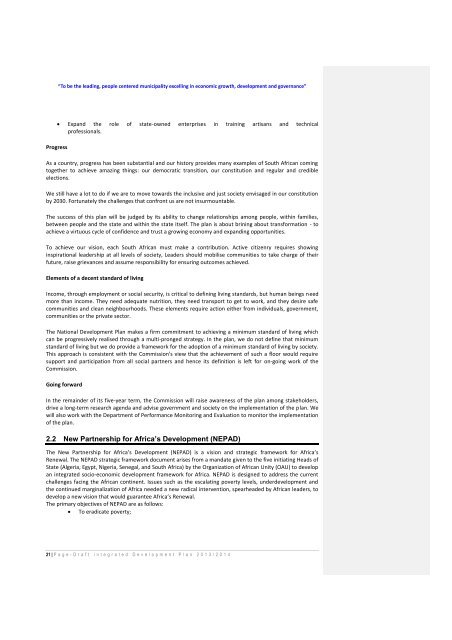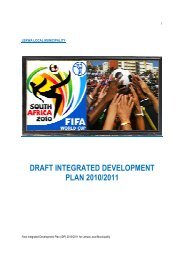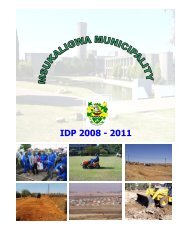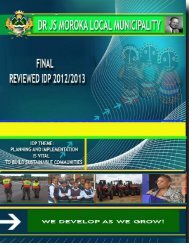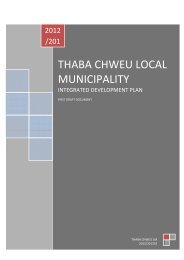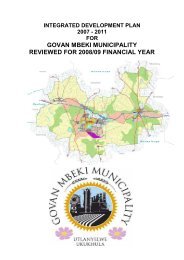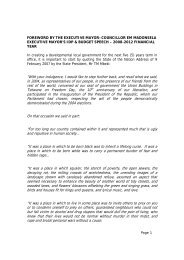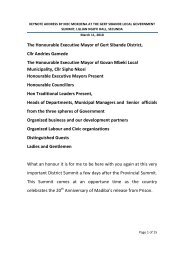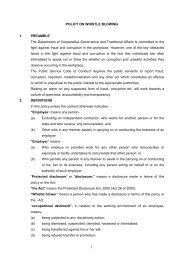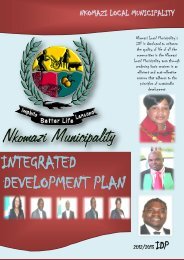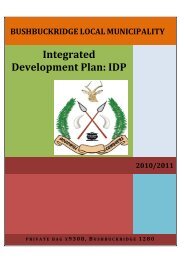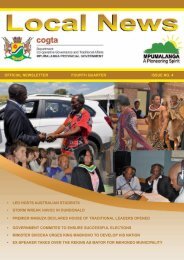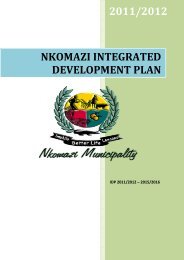Lekwa Local Municipality 2013/14 - Co-operative Governance and ...
Lekwa Local Municipality 2013/14 - Co-operative Governance and ...
Lekwa Local Municipality 2013/14 - Co-operative Governance and ...
You also want an ePaper? Increase the reach of your titles
YUMPU automatically turns print PDFs into web optimized ePapers that Google loves.
“To be the leading, people centered municipality excelling in economic growth, development <strong>and</strong> governance”Progress Exp<strong>and</strong> the role of state-owned enterprises in training artisans <strong>and</strong> technicalprofessionals.As a country, progress has been substantial <strong>and</strong> our history provides many examples of South African comingtogether to achieve amazing things: our democratic transition, our constitution <strong>and</strong> regular <strong>and</strong> credibleelections.We still have a lot to do if we are to move towards the inclusive <strong>and</strong> just society envisaged in our constitutionby 2030. Fortunately the challenges that confront us are not insurmountable.The success of this plan will be judged by its ability to change relationships among people, within families,between people <strong>and</strong> the state <strong>and</strong> within the state itself. The plan is about brining about transformation - toachieve a virtuous cycle of confidence <strong>and</strong> trust a growing economy <strong>and</strong> exp<strong>and</strong>ing opportunities.To achieve our vision, each South African must make a contribution. Active citizenry requires showinginspirational leadership at all levels of society, Leaders should mobilise communities to take charge of theirfuture, raise grievances <strong>and</strong> assume responsibility for ensuring outcomes achieved.Elements of a decent st<strong>and</strong>ard of livingIncome, through employment or social security, is critical to defining living st<strong>and</strong>ards, but human beings needmore than income. They need adequate nutrition, they need transport to get to work, <strong>and</strong> they desire safecommunities <strong>and</strong> clean neighbourhoods. These elements require action either from individuals, government,communities or the private sector.The National Development Plan makes a firm commitment to achieving a minimum st<strong>and</strong>ard of living whichcan be progressively realised through a multi-pronged strategy. In the plan, we do not define that minimumst<strong>and</strong>ard of living but we do provide a framework for the adoption of a minimum st<strong>and</strong>ard of living by society.This approach is consistent with the <strong>Co</strong>mmission's view that the achievement of such a floor would requiresupport <strong>and</strong> participation from all social partners <strong>and</strong> hence its definition is left for on-going work of the<strong>Co</strong>mmission.Going forwardIn the remainder of its five-year term, the <strong>Co</strong>mmission will raise awareness of the plan among stakeholders,drive a long-term research agenda <strong>and</strong> advise government <strong>and</strong> society on the implementation of the plan. Wewill also work with the Department of Performance Monitoring <strong>and</strong> Evaluation to monitor the implementationof the plan.2.2 New Partnership for Africa’s Development (NEPAD)The New Partnership for Africa’s Development (NEPAD) is a vision <strong>and</strong> strategic framework for Africa’sRenewal. The NEPAD strategic framework document arises from a m<strong>and</strong>ate given to the five initiating Heads ofState (Algeria, Egypt, Nigeria, Senegal, <strong>and</strong> South Africa) by the Organization of African Unity (OAU) to developan integrated socio-economic development framework for Africa. NEPAD is designed to address the currentchallenges facing the African continent. Issues such as the escalating poverty levels, underdevelopment <strong>and</strong>the continued marginalization of Africa needed a new radical intervention, spearheaded by African leaders, todevelop a new vision that would guarantee Africa’s Renewal.The primary objectives of NEPAD are as follows: To eradicate poverty;21 | P a g e - D r a f t i n t e g r a t e d D e v e l o p m e n t P l a n 2 0 1 3 / 2 0 1 4


